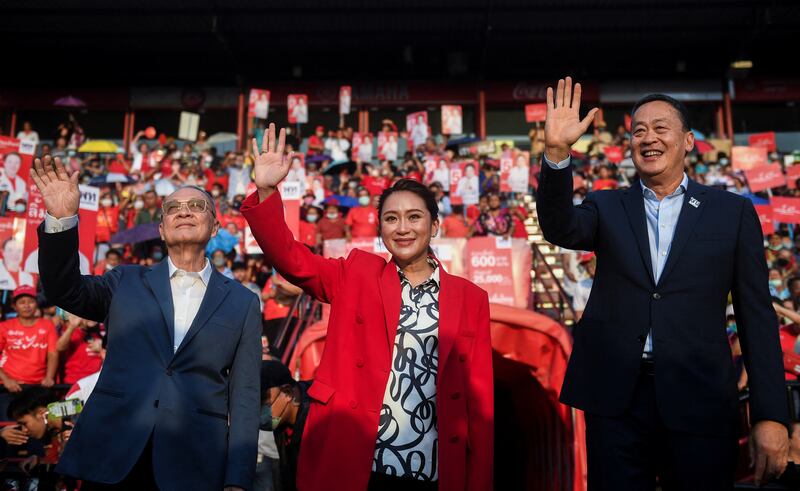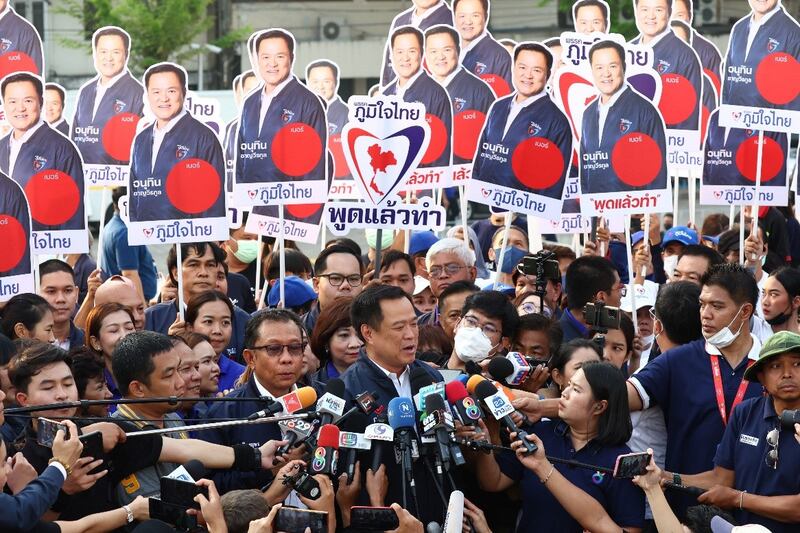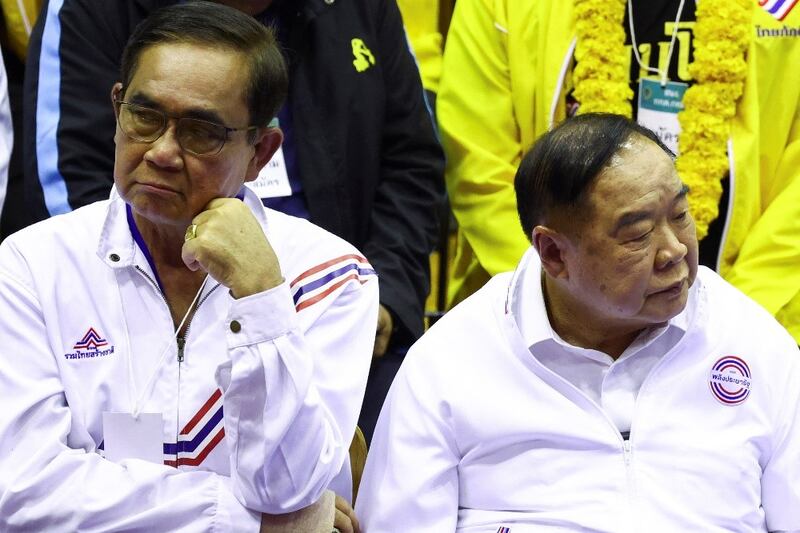We’re now under 40 days out from Thailand’s general election, the most fluid political environment in recent memory.
The 2019 electoral battle lines are not holding in the run-up to the May 14 polls, which will be a verdict on the government of Prayuth Chan-o-cha, who came to power in a coup almost a decade ago. Parties have jettisoned prior principles for populist programs.
Anti-incumbency sentiment is strong.
Despite all the advantages of gerrymandered and mal-apportioned districts, an Election Commission and judicial system under the military’s thumb, as well as the appointed Senate’s role in electing the prime minister, the ruling coalition is in a weak place electorally, but not necessarily politically.
The opposition Pheu Thai party continues to dominate the polls.
In the National Institute of Development Administration (NIDA) poll conducted in early March, Pheu Thai received 49% support. Later that month, a Suan Dusit Rajabhat University poll listed support at 46%.
While Pheu Thai members are publicly talking about delivering an utter rout of 310 seats, they will more likely win about 50% of the lower house seats.
Paetongtarn Shinawatra is polling well amongst the public and continues to be the preferred choice of the majority of the electorate, with 38%, according to a recent NIDA poll – more than double her closest competitor.
But given the need to put together a coalition of 376, she could be sidelined in favor of a less polarizing figure such as Srettha Thavisin or Chaikasem Nitisiri.

Meanwhile, another opposition party, Move Forward was polling at 17% and appears to be poised to have a strong finish, despite a number of legal cases against its senior leadership. These cases have not cowed the party’s leaders as intended, but only emboldened them.
Party leader Pita Limjaroenrat was polling at just under 16%, according to the mid-March poll. Move Forward is expected to again dominate in Bangkok, which is the largest province in the country, with 33 seats.
But Move Forward remains an urban-based party without a strong rural strategy or network, although it is contesting all 400 districts. In the past, the party didn’t need to due to its alliance with Pheu Thai.
Incumbent gains ground
Prayuth is recovering in the polls. He’s now polling at above 15% and should have the advantage of incumbency. He and his new United Thai Nation Party (UTN) will surpass the 25-seat threshold to be able to elect a prime minister.
The prime minister and UTN will likely outperform their current poll standing as conservative royalists still support him and see him as their standard bearer.
Because of the 250-member appointed Senate’s role in electing the prime minister, Prayuth needs to cobble together only a 121-seat majority, not the 376 seats that an opposition coalition must reach. Still, his poll numbers are a searing indictment of his poor leadership.
This is also based on the assumption that the Senate will vote en bloc. The military-appointed body is conservative and it’s hard to see them splitting their vote in a way that would allow an opposition figure to gain the premiership.
Pheu Thai’s Paetongtarn is making her own assumption that the Senate will have to respect the vote and endorse the candidate with a plurality of the vote.

Meanwhile, the Bhumjaithai (BJT) Party is doing much better than polls would suggest. Anutin Charnvirakul doesn’t poll well personally, receiving less than 2% of popular support in the last NIDA poll. But the party has been the single largest landing pad for defecting MPs and is poised to be the kingmaker in the election.
BJT is expected to win at least 70 seats. A former Pheu Thai MP, but trusted enough by the conservative elite, Anutin has some crossover appeal.
The Democrat Party is not completely dead in the water and will serve in any conservative coalition government, but it has become a regional party with little nationwide support. The country’s oldest party sold out its principles when it endorsed the 2014 coup and now has only 5% support.
The ruling Palang Pracharath (PPRP) is now the wildcard in the election. It’s cratering in the polls, with under 3% support, while its candidate for prime minister barely rated at all. These are devastating numbers for an incumbent government.
But PPRP is running candidates in all 400 constituencies and has real resources, which is important in a system with endemic vote buying.
The party’s sole prime minister candidate, Prawit Wongsuwan, has jettisoned conservative talking points and adopted his own populist policies. He’s a poor campaigner, and he’s losing out to Prayuth for support from the conservatives and royalists. He is running as both the proportional and party-list candidate, which is telling.
But the PPRP is desperate to remain in power. To do so, the party will have to come to some sort of agreement with UTN, the Democrats, and other conservative parties such as BJT, brokered by political and ultra-royalist elites that the Senate will endorse.
There may be a rift between Prayuth and Prawit, but it’s not irreconcilable. Again, they need only a 121-seat coalition with Senate backing.
This scenario is based on the assumption that Prawit can get the Senate to break with him over Prayuth. But given the fact that the Senate was put in place to keep Thaksin Shinawatra's family (in this case his daughter) and his political machine out of politics, it's less plausible. Even less so is seeing Prawit get a large percentage of the Senate to endorse this.

Moreover, there’s debate over who would head such a coalition.
Prawit clearly believes that he should, given his influence in the Senate. But it would be hard to fathom Paetongtarn or any other Pheu Thai leader agreeing to this, especially if they win 50% of the vote or more.
It’s also not clear how many seats PPRP will win. The party has high hopes but is underperforming and anti-incumbent sentiment is soaring.
It also assumes that Pheu Thai is willing to be part of a centrist coalition. Though they are to the right of Move Forward, public preference seems to be for a more progressive policy agenda. And Move Forward’s Pita has made clear he would never be in a coalition with PPRP.
Finally, while the allocation formula for the 100 party-list seats is more transparent than in 2019, there’s still room for political machinations.
Although it seems unlikely that the royalist elites will move aggressively against the surging opposition parties, as they did in the run up to the 2019 polls when parties were dissolved, there’s plenty of time for politically motivated lawsuits or for the military-controlled Election Commission to disqualify candidates.
Such tactics could prove counterproductive and result in a popular backlash, but it’s a well-used tool in the toolbox.
Zachary Abuza is a professor at the National War College in Washington and an adjunct at Georgetown University. The views expressed here are his own and do not reflect the position of the U.S. Department of Defense, the National War College, Georgetown University or BenarNews.
